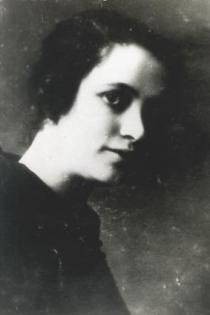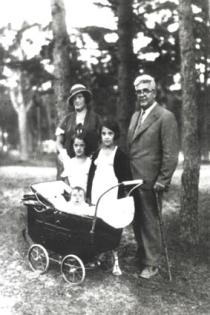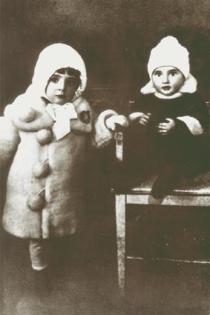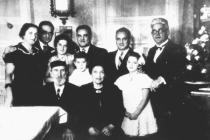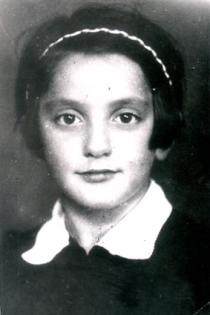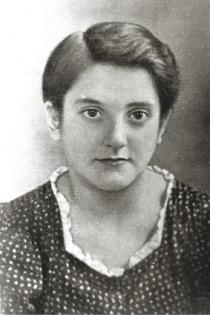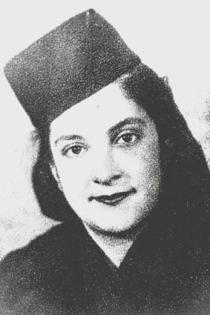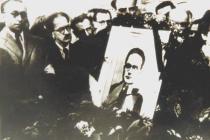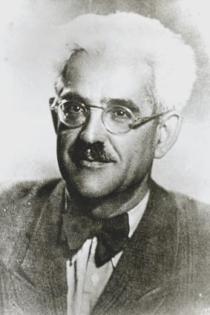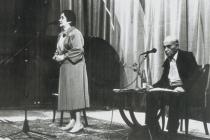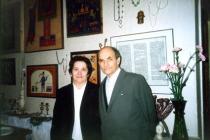This photograph shows our family. It was taken in 1934 in Palanga. Here I’ll tell you about my ancestors, though I remember not much.
Unfortunately I know nothing about my great-grandfathers and great-grandmothers. I know only that they all came from Lithuania. Daddy used to say that his grandfather was a water carter, but possibly it was a joke. Most of my relatives lived in the small shtetl Plunge near Klaypeda. [Klaypeda is the third large city in Lithuania, it is situated near the Baltic sea on both sides of the River Dane]. I remember that my paternal grandmother's name was Hana Rolnikene.
My paternal grandfather's name was Itsik Abel Rolnik. In Polish rolnik means a farmer, but as far as I know there were no farmers among our family members. He was an old religious Jew wearing beard and observing traditions. He was an owner of a small shop. My grandmother Hana was very vigorous and witty. She gave birth to 10 children and brought all of them up. Unfortunately not all of her children survived: some of them died before the war. At the beginning their shop was very small: buttons, ribbons, etc. (dry goods). Later they added fabrics and finished articles. Grandmother told me that under the counter she had a wooden bucket (where women used to wash linen). In that bucket she kept her baby, she rocked that makeshift cradle with her foot and sold goods at the same time. The only break she had was a short time in small pantry to breast-feed her baby. That was the way she brought up her children!
My grandfather was religious: he attended synagogue. By nature he was very silent and sedate, and my grandmother (on the contrary) was very witty. Here is an example. She had got a brother who lived in the neighboring city. He used to send her letters, but wrote a miserable scratch. Therefore my grandmother sent him the following message: come to our place and read your letter!
In 1938 the shop passed into the hands of my uncle Berl (my father's brother). Grandmother did not rely on his ability to be engaged in commerce; therefore she poked fun at him: 'After my death, make a small hole in my coffin, so that I will be able to watch you doing without me.' In 1940 the shop was nationalized and my grandmother could not stand it. That shop was her brainchild and they dared to take it away from her. Grandmother died on January 3, 1941. And nationalization campaign was finished by autumn of 1940 (when Lithuania became a Soviet Republic 1). She died in her sleep from cerebral haemorrhage. At that time she was 64 years old. Her heart was so strong that relatives had time to send for Daddy and other sons. They arrived and had time to pay the last tribute to her. Daddy made a speech during the funeral, though it was not customary. He spoke about her merits, about what relatives were grateful to her for.
Grandmother and grandfather sent my father to cheder, when he became 12 years old. It was situated in the neighboring small town. But Daddy quickly got disappointed in it and came home afoot. Later he finished a secondary school and went to Riga to study in gymnasia. Parents were able to buy him a black suit and a tie and that was all. He went to Riga having no money. Therefore Daddy worked as a porter and as a loader. When his trousers became full of holes, he made patches from his tie. He managed to finish that gymnasia in Riga (for some reason it appeared to be a Russian gymnasia). Daddy decided to become a lawyer and study at a university in Germany. He studied in Berlin and Leipzig. He graduated from the faculty of law and later from the College of German Language and Literature which prepared teachers of German language and literature for foreigners.
I can't recall my Mom's father, but I remember her mother. Unfortunately I can't recollect her name. She was very religious. She lived in Telshe, but when she visited us, she used to be sitting and praying all the time. She also was very displeased if we broke rules during Shabbath. My mother's father died before I was born, his surname was Kogan.

